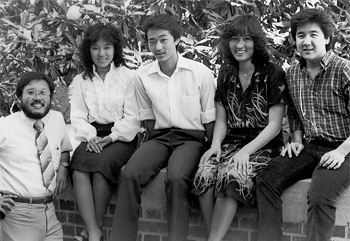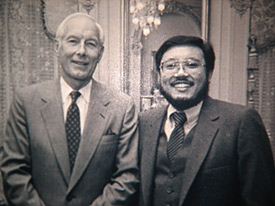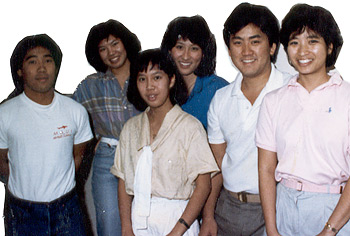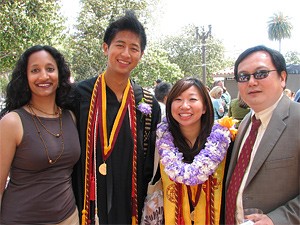APASS History from 1980s – Present
by Jeff Murakami, former student leader and former APASS Director (1990-2007)

Once upon a time, a university counselor gathered a group of Asian Pacific American (APA) students at the University of Southern California to reflect on their college experiences and how it might be improved. The students were doing well academically and seemed to be increasingly more engaged socially through the emergence of various ethnic organizations, but what they seemed to lack was a sense that the University recognized them, appreciated their diverse cultural experiences, and sought to provide relevant services to them.
These students, many of whom were the leadership of a newly-formed student organization, the Asian Pacific Student Outreach (APSO), began to strategize ways to get the University to recognize them and their concerns. The students, led by Michael Matsuda, Scott Lee, Karen Wong, and advised by USC staff psychologist Dr. Sarah Miyahira, organized a series of meetings with university administrators, including the new university president Dr. James Zumberge, and public “demonstrations” (sometimes with as many as 200 students gathered). Together with Black and Latinx student groups, a coalition emerged to advocate for a viable Ethnic Studies program and for APA student services.
Lo and behold, they were heard. With the support of Vice President for Student Affairs Dr. James Appleton, the students and Dr. Miyahira were able to propose a new student service department, one that addressed the distinctive needs of the growing APA student population and connected APA alumni and communities to the University. With such a win-win proposal in hand, the administration created the Asian Pacific American Student Services (APASS) department in February of 1982 with the hiring of J.D. Hokoyama as its first director.
Among the many challenges for Hokoyama were 1) he was only employed half-time 2) he had a small office in Student Union 202H and 3) he had NO BUDGET. Undaunted, Hokoyama proceeded to creatively tap into the resources and networks that he had established through years of community and educational work. The result was the Asian Pacific American Support Group (APASG), and its task was to support the department and to raise scholarship dollars. Key to this effort was the leadership of alumni and friends like Irene Hirano, Edwin Hiroto, Kenneth Kasamatsu, Alan Kumamoto, Dennis Kunisaki, and Frank Kwan.

Hokoyama also networked successfully with student leaders and organizations, making a case for APASS. Students like Karen Wong, Ron Yamada, Jeff Murakami, David Wong, and Pauline Ng soon learned the value of having an APASS: a link to the administration and wider APA community. Hokoyama learned about the campus culture and how to navigate it with the help of university staff members led by Mary Kurushima. Other key supporters included Janice Hsia, Doris Ishikawa, Rev. Diane Kenney and Mitzi Tsujimoto.
Within one year, Hokoyama was able to convince the university to grow APASS to support him full-time and to provide some support staff: a secretary and a handful of students. Equipment and furnishings came through funds raised by the APASG or as hand-me-downs from other offices. The fledgling APASS department required more space, so it moved upstairs to Student Union 407. Providing management support during this time were administrative assistants Denise Kurushima followed by Donna Maeda.
Among the accomplishments during APASS’ early developmental period were the establishment of the APASG and a scholarship endowment fund, annual scholarship fundraising dinners honoring APA community leaders, the annual Student Welcome orientation, community and professional speakers, the Asian Pacific Consortium (a meeting of APA student organization leaders), a holiday alumni-student mixer, and student organizational advisement.
Following Hokoyama was Jeanne Yeo-Ishikawa, who was not only new to USC, but also to Southern California. Arriving from the East Coast in late August 1987, Yeo-Ishikawa jumped right in and tried to simultaneously acculturate and direct the department, again, with almost no programming budget. However, with support from the APASG, administrative assistant Lana Chin, and student staff, Yeo-Ishikawa was able to direct APASS through the next year and hold the fourth annual scholarship dinner while adding programs like Career and Professional Development workshops and the ‘Ohana club, a group of USC faculty and staff from Hawai’i.
In late 1988, Yeo-Ishikawa left APASS to another position on campus where she continued her advocacy for APA students. The following seven-month vacancy was made easier by the hard work of administrative assistant Aileen Almeria, interim-director Chris Vivo, and student staff. APASS was now located in STU 408. During this time, APASS developed a partnership with UCLA called the Asian Pacific American Leadership Development Project (USC CIRCLE’s predecessor) and established a relationship with LAUSD teacher Jenny Chomori that has lasted nearly two decades!

Yoon Hee Kim arrived in June 1989 as the new APASS director and was able to direct APASS through the APASG’s fifth annual scholarship fundraising dinner and APASS Fall programming. Unfortunately, Kim was recruited by LA Mayor Tom Bradley for his staff in early 1990, leaving APASS in the hands of “interim administrative assistant” Jeff Murakami who, in July 1990, became APASS’ fourth director. APASS then moved to its current space in STU 410-411.
Murakami was committed to staying at least four years in order to stabilize the department and to re-establish its identity on campus and in the wider APA community while developing programs and a budget. However, his first task was building a staff. Nerissa Mojica served as his first Administrative Assistant, followed by Juliet Kim in 1992.
Despite the dire budget situation at USC in the early 1990s, APASS was able to establish new programs including a career mentoring program (now known as Connections!) with the help of the APASG, the Asian and Pacific Islander Faculty and Staff Network, and Dr. Kay Song, Dr. Shing-Shiong Chang, Dr. Bob Nishimoto, and Dr. Tu-Nan Chang. APASS and the APASG also hosted a major reception in 1991 to welcome new USC president Steven Sample. APASS also joined the UCLA Asian American Studies Center in sponsoring the Asian Pacific American Community Research Roundtable, which was hosted at USC for the first time in 1992.
That same year, APASS was confronted by another challenge: a reorganization of the culturally-based student service offices into a cross-cultural unit. Despite public and private protests and advocacy by alumni, students and staff, USC announced the creation of the “Office for Academic and Cultural Services” (OACS) on April 27, 1992. Two days later, the context would change dramatically when the LA Civil Unrest erupted. Within that context, the OACS model struggled and eventually was dissolved.

By 1994, the US and USC economies were recovering, and Student Affairs had new leadership, Vice President Michael L. Jackson. With Jackson’s support, APASS was allowed to develop an Assistant Director position and a department secretary. APASS Administrative Assistant Andrea Nguyen assumed the role of APASS’ first assistant director for alumni-student programs. Over time, APASS grew a half-time department secretary into an office manager position with Maryann Solidum, Jamie Kim, Arlene Fader, Mark Orne, Naomi Suwa, Laurie Kawakami, and now Jeymi Choi filling this role over the years.
Also in 1994, APASS launched the PEER Mentoring program in conjunction with the Student Counseling Services. With the active leadership of Drs. Shing-Shiong Chang and Kari Yoshimura, the mentoring program trained students to help first-year undergraduates adjust to campus life and deal with personal issues. During that same period of time, APASS was helping build the Asian American Studies component of a new Program in American Studies in Ethnicity. Partnering with the College of Letters, Arts and Sciences, APASS helped conduct surveys of undergraduates and gave administrative support to the LAS faculty committee, which resulted in a search for tenure track faculty. The search netted three faculty, including current Asian American Studies director Lon Kurashige.
While APASS was continuing to build its capacity for student services, it was struggling to define its role in alumni relations and development. Although APASS, through the APASG, was successful in these areas (the scholarship endowment tripled from 1990 to 2000), it was apparent that much more could be done for USC’s large APA alumni population. So for a period of 3 years, APASS and the APASG, supported by Assistant Directors Michelle Esperanza, Sharon Suh, Willette Clark, and Jennifer Hong, increased alumni activities, including a 1997 scholarship gala that featured both President Sample and former Annenberg School for Communication Dean Geoffrey Cowan. This increased activity, however, made it clear that APASS could not adequately serve both students and alumni with its current resources; in 1998, APASS and the APASG began a conversation with the USC General Alumni Association about creating a new unit to serve APA alumni.
Nearly three years later, USC created the Asian Pacific Alumni Programs. This development allowed APASS to hire its first assistant director dedicated solely to student programs: Yoshiko Matsui. She was succeeded by Sumun Pendakur, who joined APASS in December 2004 as Assistant Director and assumed the role of Director from August 2007-May 2012. Under Pendakur, APASS has added transnational dialogue programs, an Asian Pacific American career development curriculum, and additional service-learning opportunities, such as Alternative Spring Break at Manzanar National Historic Site. Jade Agua served as the Assistant Director from December of 2007-August 2012.
In August 2012, Jonathan Wang joined the APASS team as the new Assistant Director, and in October 2012, Mary Ho joined the staff as the new Director.
In 2017, with partnership with the Office for Residential Education, APASS founded the Asian, Pacific Islander, and Desi American Leaders Community special interest floor (APIDA Floor) at the Birnkrant Residential College.
Today, APASS features established programs in mentoring, orientation and leadership development, a rich and complex educational vision, strong partnerships within USC and in the wider APA community, and a historic support group of alumni and friends.

